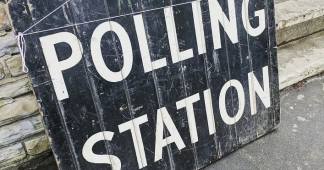By
Sep. 24, 2021
In hindsight, the biggest warning sign for the prospects of unionizing Amazon‘s Bessemer, Alabama, warehouse was, well, a sign: a large placard, posted by organizers outside the facility’s entrance, featuring Stacey Abrams dressed as Rosie the Riveter, declaring “We Can Do It!” through a COVID mask.
Adopting the failed gubernatorial candidate and progressive darling as the symbolic heroine of the campaign was part of an effort to link unionization to progressive causes—voting rights, racial justice and gender equity—that organizers thought would appeal to a predominantly Black workforce.
“Stacey the Riveter” may have been a hit with Democratic politicians, who posed for pictures with the sign on visits to the facility. But not so much with the workers themselves. Abrams lost her election by 2 points; the union lost its by more than 30.
Bessemer was hardly the first time that union activists have grafted progressive causes onto the labor movement. The year before, then-AFL-CIO president, Richard Trumka, pledged that organized labor would “be an ally” of the LGBTQ community and Black Lives Matter by “invest[ing] in Black transgender leadership” and “electing candidates…who understand the intersectionality of worker and LGBTQ rights.”
This “intersectionality” of labor issues and virtually every progressive social cause has become a defining feature of union activism. United Steelworkers, for instance, has “encourage[d] all local unions to initiate LGBTQ+ activism” led by its Steel Pride affiliate organization. Labor leaders from the SEIU and other national labor unions, meanwhile, have formed the Labor for Equality Council to promote the Equality Act because “LGBTQ rights and labor rights are intrinsically linked.” Labor reformers have fallen prey, too. Harvard University’s “Clean Slate for Worker Power,” for instance, maintains that its blueprint for redesigning labor law “must start with inclusion” and “address systemic racial and gender oppression.”
Continue reading at www.newsweek.com
We remind our readers that publication of articles on our site does not mean that we agree with what is written. Our policy is to publish anything which we consider of interest, so as to assist our readers in forming their opinions. Sometimes we even publish articles with which we totally disagree, since we believe it is important for our readers to be informed on as wide a spectrum of views as possible.











